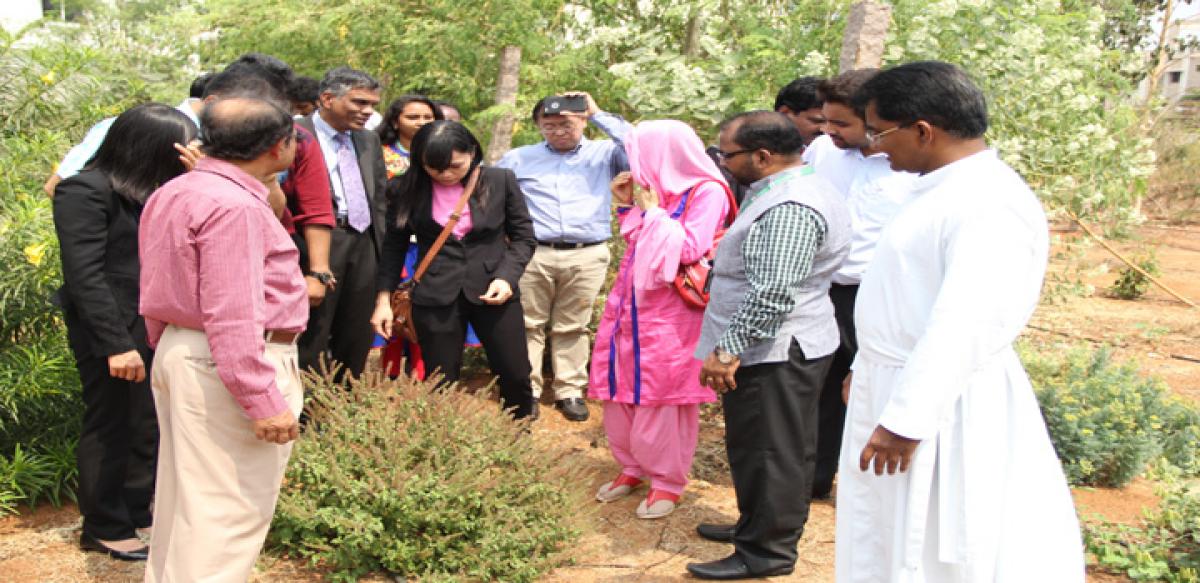Live
- 3 held, 810 kg ganja seized
- Workshop on ‘Live Agri-technologies’ concludes at SPMVV
- Advancing Biomedical Research with NMR techniques
- Key Highlights of India in 2024
- Expose Opposition’s evil propaganda in villages: Seethakka to Cong workers
- MLA Sudhir focuses on amenities at Srikalahasti rly station
- Chittoor police crack down on drunk driving with 963 cases
- Vision document historical, says Keshav
- YSRCP to boycott elections to WUAs
- Farmers led by YSRCP leaders stage protest against graft
Just In

Nanotechnology has tremendous applications in biomedical, agriculture and food technology to improve the quality of products that are immensely used. In Agricultural Biotechnology Green synthesised nanoparticles have been used as bio-fertilisers and organic nutrients to improve the growth and yield of crops.
Hyderabad: Nanotechnology has tremendous applications in biomedical, agriculture and food technology to improve the quality of products that are immensely used. In Agricultural Biotechnology Green synthesised nanoparticles have been used as bio-fertilisers and organic nutrients to improve the growth and yield of crops.
Various research institutes in Hyderabad have shown significant development in nanobiotechnology research, Loyola Academy Degree & PG College is one of the successful pioneers for green synthesis of nanoparticles, nanobio technology research, applying it on plants at Loyola farm as organic nano fertiliser and studying their effect on the growth of plants.
Generally chemical synthesis of nanoparticles is very toxic and costly process. So, Green synthesis of nanoparticles has been explored widely due to its non toxicity and utility in the biomedical field. Plant extract, Hemidesmusindicusis and Carica Papaya were utilised for the production of silver and zinc nanoparticles respectively, reducing silver nitrate and zinc nitrate biologically by the research team at Loyola Academy headed by Fr L.Joji Reddy SJ.
Silver nitrate is mixed with plant extract incubated and synthesis of silver nanoparticles is studied employing UV-Vis spectroscopy. Using FTIR, SEM equipped with EDS characterisation of nanoparticles was done. The silver nanoparticles were found to be 40-90 nm in size and spherical in shape.
The results which were obtained demonstrated that the root extract of hemidesmus and leaf extract of Carica papya are excellent bioreductants for synthesis of silver nanoparticles and zinc nanoparticles and these produced nanoparticles were tested and conclusion was made that these nanopartciles were effective against isolated pathogens, Staphylococcus aureus, Pseudomonas and E coli.
L Joji Reddy, Vice Principal, Associate professor in the department of biotechnology and his research group P Suresh Kumar, Ch. Prakash Amruth Raj, Y Sharanya published their work as research articles entitled “Biosynthesis of Silver Nanoparticles by usingHemidesmusIndicus Root Extract and Analysis of their Antimicrobial Property against Isolated Pathogens” and “Production of Bioactive compounds by plant based Biosynthesis of ZnO by papaya leaf extract”.
The research findings were presented in International conference "Emerging Trends in Synthesis of Nano Particles in Agri Biotechnology Research Commercialisation" conducted at Loyola Academy from February 25 to 27, 2016. The conference was organised jointly by Loyola Acadmey and Prathista Industries Ltd.

© 2024 Hyderabad Media House Limited/The Hans India. All rights reserved. Powered by hocalwire.com







